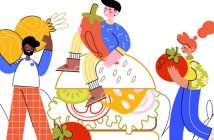My son and daughter are each refusing to eat their vegetables in turn. It’s pushing me over the edge of the patience volcano into bubbling lava of irritation. I’ve just stood up from the table, struck with helplessness about wasting the plates full of organic (and decidedly overpriced) vegetables. Why won’t my babies eat these?
I leave the table.
As I let my shoulders relax in the little galley kitchen of our very Chinese-style apartment, I’m wondering if I’ll have to quietly put these remaining veggies into a smoothie yet again, disguised with fruits and yogurt, and then freeze them as popsicles for my two stubborn kids. Maybe that is every parent’s only option when dealing with a pre-schooler-with-attitude and a toddler obsessed with copying his sister? Maybe that’s called nutrition management for frustrated parents? Maybe that’s success, not failure.
My friend Laura, who used to own and run the restaurant The Veggie Table, personally visited all the organic farms before ordering their products for her restaurant. I admired this. When she and I met, I was pregnant with my daughter and rubbed my belly while deciding that I should do the same for my children. I had no reason to suspect I’d have no time for such luxurious fact-finding missions.
Five years sped by, and in an era of obsession for market shares in growing industries, particularly the fresh organic produce industry in Beijing, many companies have popped up that offer free delivery services of organic vegetables. It’s hard to know which is the most reliable. Are they all using clean soils, clean water, and adhering to non-pesticide use? And while most don’t offer the official stamp of organic certification (apparently very difficult to obtain in China), how then are their farming practices regulated? What are the standards to which their produce is being upheld? Who does the monitoring?
As a conscious consumer, I am skeptical, but certainly have no time to visit farms as a working mother of two. So, what should I do? Without an answer forthcoming, I’ve moved forward: I’ve done orders from four different farms and purchased organic at my local fruit shop. I’ve even travelled slightly farther on my bike to the organic imports shop and then plunged into my pocket for twenty yuan in exchange for six tomatoes.
Surely some of this spending will be smart, I rationalize. Surely someone is following ethical organic farming rules, even if there is no official stamp. Surely the taste (those expensive tomatoes were truly divine) is evidence of superior quality!
Standing in the kitchen on this day, I take a deep breath while glancing at my blender. I envision the smoothie I will make this evening and shrug it off. I have some of these exact same popsicles still in the fridge from last week, dyed blue with food coloring. The kids love them.
My volcano stops bubbling. I edge back down into the foothills of patience and return to the table, ready to tackle stage two of the dinner consumption persuasion hour. I smile. I decide to model behavior rather than disciplining and start devouring the vegetables, happily, telling them how delicious they are.
“You can’t have any,” I say, winking. “These are all for mommy! Look, yum!” Chew, chew. “Too bad you can’t have any!”
My daughter is intrigued. “Why can’t we have any?” she asks, brow furrowed.
“Because they’re too delicious,” I say, between chews.
“But mommy,” she says, still confused, adding another sentence that astonishes her so-called “mastermind” of a mommy:
“I like them better in popsicles.”
This article originally appeared on page 40 of the August 2016 Issue of beijingkids magazine. Click here for your free online copy. To find out how you can obtain a hard copy, contact distribution@truerun.com.
Photo: thestar.com




